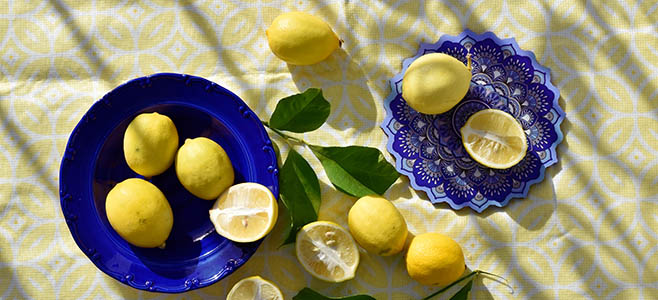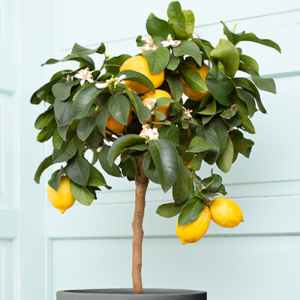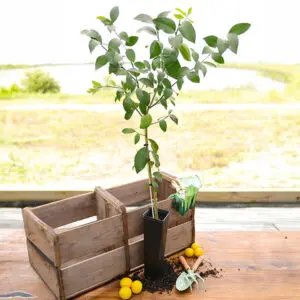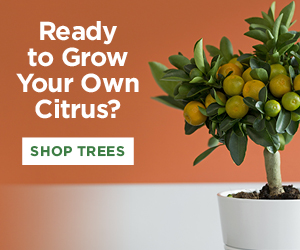
They show up in the produce section (if they show up at all) during the winter months at about the same time the Key Limes do – diminutive, yolk-gold lemons with a round shape and a fragrant peel. They’re Meyer Lemons, and they look pretty, they smell pretty…but what are Meyer Lemons? And how are they different from regular lemons?
Meyer Lemons at a Glance
When we talk about a “regular” or “true” lemon, we mean the type of lemon you’ll find most often in the grocery store. There are a number of varieties of true lemon, but Eureka and Lisbon are the most common. You know them well – a fruit around five to eight centimeters in length, bright yellow and supremely useful in so many ways except for snacking on fresh out of hand due to their mouth-puckering taste.
Their smaller cousins, the Meyer Lemon, give you that lovely lemon flavor without (quite) as much sourness – in fact, some brave souls do eat them fresh out of hand, adding the wedges to salads and other dishes.
The chart below explains what Meyer Lemons are, how exactly they differ from true lemons, when they’re available and how you can use them:
| True Lemon | Meyer Lemon | |
| What is it? | One of the world’s most popular citrus fruits. It is a hybrid of a citron (one of the original citrus fruits) and a lime. | A hybrid of a true lemon and a mandarin orange introduced to the US in 1908 by agricultural explorer Frank Meyer. |
| Appearance | True lemons are 5-8 cm long with an oblong shape, bright yellow, knobby peels, thick layer of white pith, and pale-yellow flesh. | Meyer Lemons are smaller than true lemons with a rounder shape, dark yellow to orange peels that are thin and smooth, and deep yellow flesh. |
| Season | Available year-round. | Available December through May. |
| Taste | Moderately sweet but highly acidic with a bitter rind. | Sweet, floral and moderately acidic with a fragrant, bergamot-scented edible rind. |
| Uses | Juice, flesh and zest can be used in cocktails, spritzers, salad dressings, sweet and savory recipes and as a garnish for main dishes and drinks. | Juice, flesh and zest can be substituted for that of true lemons in most recipes, especially sweet dishes. May not be suitable in recipes where the stronger acidity of true lemons is called for. |
How to Store Meyer Lemons
Most citrus holds up well when stored in the refrigerator, but, due to their thin skins, Meyer Lemons are one of the few exceptions (this is also why finding them in the grocery store when they’re in season is hit-or-miss). If you do get your hands on some Meyer Lemons, make sure you get the most out of them by storing them properly. The best place is in a sealed plastic bag in your fridge’s crisper drawer, where they’ll last up to a week. They’ll only last a few days at room temperature, so if you prefer them that way keep them in the fridge until about half an hour before you’re ready to use them.
Grow Your Own (Meyer) Lemons at Home!
One of the best things about Meyer Lemons is being able to grow your own just about anywhere – even if you don’t live in a warmer climate! Meyer Lemon Trees are on the smaller size, so if you live in Growing Zones 5-9 but have limited garden space, you’ll likely still have room for a Meyer Lemon Tree (and since citrus trees are self-pollinating, you only need to plant one to enjoy fruit).
If, on the other hand, you live in Growing Zones 4 and above (which is most of the United States), you can keep a dwarf Meyer Lemon Tree in a pot year-round! Meyer Lemon Trees are easy to grow and do well in pots (in fact, they were most often kept as ornamental houseplants when Frank Meyer stumbled across them in China), wintering over indoors in a sunny window and spending the summer months on your deck or patio. With its evergreen leaves, fragrant blossoms, and bright fruit you can pluck and use in your own cooking, Meyer Lemon Trees add beauty and interest to indoor settings.
Where to Buy Meyer Lemon Trees Online
If you’re wondering where to buy a lemon tree, Yarden offers several lemon tree varieties, including a variety of both standard-sized and dwarf-size Improved Meyer Lemon Trees for sale. To determine which lemon tree is best for you, you’ll want to consider where you live and how much space you have. If you buy a Dwarf Lemon Tree, you’ll be able to keep it in a pot that you can move indoors when the weather gets cold.
Among other varieties, you can find a Dwarf Meyer Lemon Tree for sale on Yarden.com. Check our website to find a tree that’s right for you, as well as accessories and tips on how to keep it healthy. You’ll soon be looking forward to harvesting your own lemons at home!
-
 Dwarf Improved Meyer Lemon Tree$74.95
Dwarf Improved Meyer Lemon Tree$74.95 -
 Improved Meyer Lemon TreeStarting at $39.95
Improved Meyer Lemon TreeStarting at $39.95



